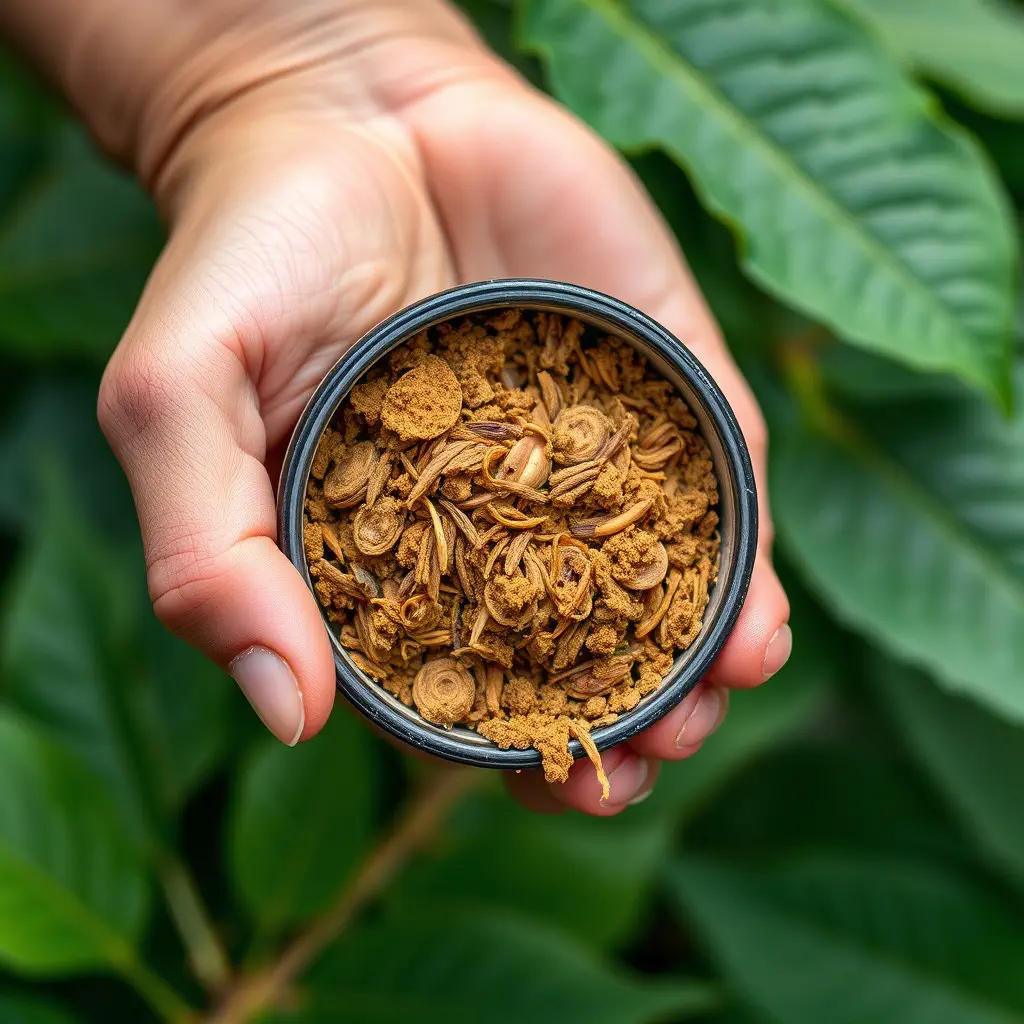Kratom, a Southeast Asian plant, has gained attention in the sports nutrition community due to its potential to enhance athletic performance and aid recovery through its ergogenic properties and stimulant effects. The alkaloids mitragynine and 7-hydroxymitragynine in kratom leaves are associated with pain management, which can be beneficial for athletes dealing with musculoskeletal discomfort. Additionally, kratom's sedative qualities can support a healthy sleep pattern, crucial for muscle repair and overall athletic performance by facilitating restorative sleep. However, it's important to consider the legal status of kratom and individual variability in its effects. Athletes interested in using kratom should consult healthcare professionals for safe and effective dosing, as well as to avoid potential interactions with other substances. It's vital to maintain a balanced diet, proper hydration, and a well-structured training regimen as foundational elements for athletic success, complemented by the strategic use of kratom for restful sleep to enhance recovery and performance. Users should always adhere to local laws and use kratom responsibly within the context of their overall health plan.
Exploring the intersection of sports nutrition and natural supplements, this article delves into the potential benefits of incorporating kratom into an athlete’s regimen. We will dissect how kratom can be a valuable addition for enhancing athletic performance and facilitating recovery through its effects on energy levels and endurance. Furthermore, a significant focus will be placed on the role of kratom in promoting restful sleep, a critical factor in overall athlete well-being and subsequent performance. By examining current research and expert insights, this piece aims to provide a comprehensive look at how kratom for restful sleep can integrate into a balanced sports nutrition plan.
- Unlocking the Potential of Kratom in Enhancing Athletic Performance and Recovery
- The Role of Kratom in Sports Nutrition: Optimizing Energy Levels and Endurance
- Harnessing Kratom for Restful Sleep: A Critical Component in Athlete Well-being and Performance
Unlocking the Potential of Kratom in Enhancing Athletic Performance and Recovery

Kratom, a tropical tree native to Southeast Asia, has garnered attention in the sports nutrition realm due to its potential ergogenic properties. Athletes are exploring kratom not only for its stimulant effects that may enhance endurance and stamina but also for its role in promoting a restful sleep conducive to recovery. The alkaloids present in kratom leaves, particularly mitragynine and 7-hydroxymitragynine, are believed to influence the body’s pain response, which can be beneficial for athletes experiencing musculoskeletal discomfort post-exercise. By effectively managing pain, kratom may allow for more intense training sessions without compromising recovery time. Moreover, the sedative effects of kratom, when consumed in appropriate dosages, contribute to a restful sleep pattern, which is critical for muscle repair and overall athletic performance. Proper rest facilitates the anabolic processes that aid in muscle growth and rejuvenation, ensuring athletes are prepared for their next training or competitive session with optimal energy levels.
The integration of kratom into a sports nutrition plan should be approached with caution, as the substance’s regulatory status varies by country, and its effects can be highly individualized. Athletes interested in incorporating kratom into their regimen should consult with healthcare professionals to navigate dosing, potential interactions with other supplements or medications, and the legal considerations associated with its use. Additionally, the importance of a balanced diet, hydration strategies, and a well-structured training program cannot be overstated in optimizing athletic performance and recovery. Kratom for restful sleep may be one piece of the puzzle, but it complements rather than replaces these foundational elements of sports nutrition and training.
The Role of Kratom in Sports Nutrition: Optimizing Energy Levels and Endurance

Kratom, a plant native to Southeast Asia, has garnered attention in the realm of sports nutrition due to its potential ergogenic properties. The alkaloids present in kratom leaves can influence the central nervous system, providing a boost in energy levels and endurance for athletes. When incorporated into a sports nutrition regimen, kratom may help athletes optimize their performance by enhancing stamina and reducing fatigue during training and competitions. Its stimulant effects are particularly beneficial when preparing for high-intensity activities or endurance events. Furthermore, certain strains of kratom are known to contribute to a restful sleep, which is crucial for recovery and overall athletic performance. Adequate rest ensures that the body undergoes necessary physiological repairs and replenishes energy stores, thus supporting sustained performance over time. Athletes looking to harness these benefits should approach kratom with caution, as dosage and strain selection play significant roles in its effects. It’s essential for individuals to consult with healthcare professionals before integrating kratom into their sports nutrition plan, to ensure it aligns with their specific health needs and does not conflict with other supplements or medications.
Incorporating kratom into a balanced sports nutrition plan involves careful consideration of timing and dosage. For instance, consuming kratom before physical activity can potentially elevate energy levels and endurance, while its role in facilitating restful sleep post-exercise supports the body’s recovery process. The alkaloids mitragynine and 7-hydroxymitragynine found in kratom leaves are believed to be responsible for these performance-enhancing effects. However, it is important to note that individual responses to kratom can vary significantly, and its use is subject to legal restrictions in many regions. As such, athletes should prioritize compliance with local laws and regulations when considering adding kratom to their nutritional supplementation routine for sports performance enhancement.
Harnessing Kratom for Restful Sleep: A Critical Component in Athlete Well-being and Performance

Integrating kratom into a sports nutrition plan can be a strategic approach to enhancing an athlete’s overall well-being, particularly through the promotion of restful sleep. Kratom for restful sleep has been a topic of interest among athletes seeking natural ways to improve their sleeping patterns. The alkaloids found in kratom, such as 7-hydroxymitragynine and mitragynine, are known to interact with the brain’s opioid receptors, potentially leading to sedative effects that can aid in achieving a more restful night’s sleep. This is crucial for athletes who require recovery time for muscle repair and cognitive restoration. Adequate rest is not merely about physical recuperation; it also plays a pivotal role in maintaining mental acuity and emotional balance, which are essential components of athletic performance. Proper sleep allows the body to undergo critical processes, including hormonal regulation and immune system support, thereby reducing the risk of overtraining syndrome and preventing injury through enhanced recovery.
For those athletes engaged in intensive training regimens, ensuring a restful sleep environment is paramount. Kratom for restful sleep can be a valuable addition to this environment, promoting longer periods of deep sleep that are beneficial for both physical and mental health. It’s important for athletes to consult with healthcare professionals when considering the inclusion of kratom into their wellness routine, as dosage and interaction with other supplements or medications can vary greatly among individuals. By optimizing sleep quality and duration, athletes may experience improved performance, faster recovery times, and a significant reduction in fatigue, all of which contribute to peak athletic conditioning.
In conclusion, the integration of kratom into sports nutrition regimens offers a multifaceted approach to enhancing both athletic performance and recovery. Its potential in optimizing energy levels and endurance is a significant addition to the athlete’s toolkit. Moreover, the role of kratom in promoting restful sleep cannot be overstated, as adequate rest is pivotal for peak performance and overall well-being. Athletes who incorporate kratom for restful sleep may experience improved recovery times and mental clarity, contributing to a more robust training regimen and superior athletic outcomes. As with any supplement, it is crucial to consult with healthcare professionals and adhere to recommended guidelines to safely harness the benefits of kratom within a sports nutrition plan.






